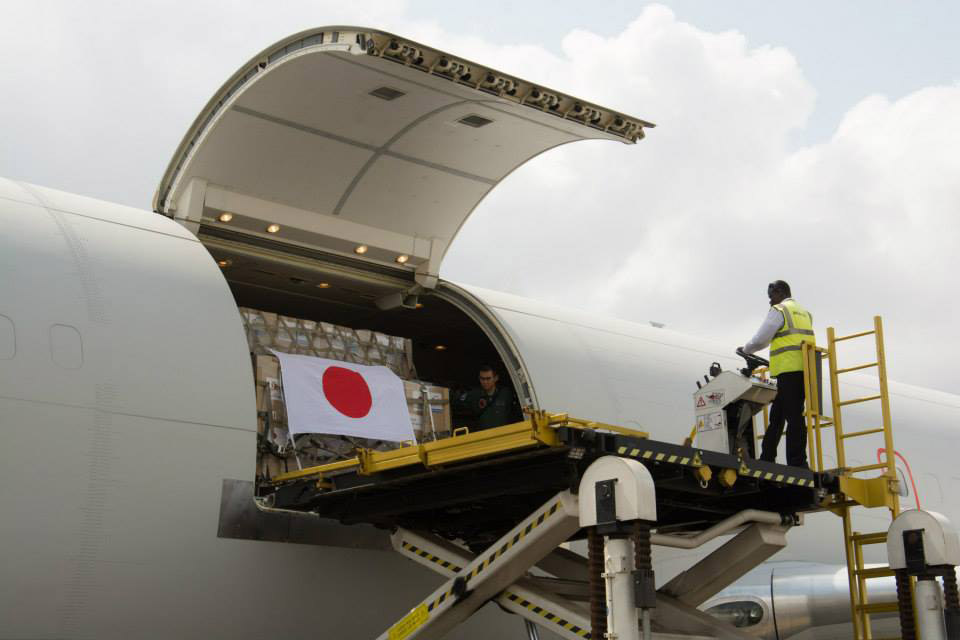 The Ebola vaccine is administered to a participant in the trial in Guinea. Photo: WHO/S. Hawke
The Ebola vaccine is administered to a participant in the trial in Guinea. Photo: WHO/S. Hawke
Having achieved its “core objective” of scaling up global action to tackle the Ebola outbreak in West Africa, the United Nations Mission for Ebola Emergency Response will officially wind down today, transferring its role to the World Health Organization (WHO), which just announced that an experimental vaccine being tested in Guinea appears to be highly effective and could be a “game changer.”
In WHO’s announcement and in results it published today in the medical journal, The Lancet, the UN health agency said the results from an interim analysis of trials in Guinea show that the VSV-EBOV vaccine is highly effective against Ebola, which has killed more than 11,000 people in Liberia, Sierra Leone, as well as Guinea, in an epidemic that has proved devastating for the region.
The agency said that while the vaccine up to now shows 100 per cent efficacy in individuals, “more conclusive evidence is needed on its capacity to protect populations.”
The Guinea vaccination trial began in affected communities on 23 March 2015 to evaluate the efficacy, effectiveness and safety of a single dose of the vaccine VSV-EBOV by using a so-called ring vaccination strategy, the agency said.
“To date, over 4,000 close contacts of almost 100 Ebola patients, including family members, neighbours, and co-workers, have voluntarily participated in the trial,” it said.
Describing the initial results as “promising” and “exciting,” WHO Executive Director said Dr. Margaret Chan told reporters: “I would like to say that if proven effective, this is going to be a game-changer. It will change the management of the current Ebola outbreak and future outbreaks.”
Meanwhile, saying the world had reached an important milestone in the global Ebola response, UNSecretary-General Ban Ki-moon announced that the UN Mission for Ebola Emergency Response –UNMEER – will close today and hand over its leadership role to WHO.
“The Mission has achieved its core objective of scaling up the response on the ground and establishing unity of purpose among responders in support of the nationally led efforts,” Mr. Ban said, adding that as of 1 August, oversight of the UN system’s Ebola emergency response will fully be led by WHO under the direct authority of its Director-General, Dr. Chan.
“The United Nations remains steadfast in its commitment to supporting the Governments of Guinea, Liberia and Sierra Leone in getting to and staying at zero cases,” the UN chief said.
His Special Envoy on Ebola, Dr. David Nabarro, who will continue to provide strategic guidance for the response, told reporters in Geneva that the UN mission “was always designed to be a temporary measure, and when it was no longer needed, the UN system would go back to its more normal disposition in responding to the outbreak.”
UNMEER, the first-ever UN emergency health mission, was established on 19 September 2014 to meet immediate needs related to the unprecedented fight against Ebola. The Mission deployed financial, logistical and human resources to Guinea, Liberia and Sierra Leone to support the push to zero cases.
In the WHO announcement, Dr. Chan said the credit for the Ebola vaccine development goes to the Guinean Government, the people living in the communities and WHO’s partners in this project.
The trial is being implemented by the Guinean authorities, WHO, Médecins sans Frontières (MSF) and the Norwegian Institute of Public Health, with support from a broad partnership of international and national organizations.
Dr. Marie-Paule Kieny, who leads WHO’s Ebola Research and Development effort, described the pace of the development as “record-breaking” that “marks a turning point in the history of health R&D.”
According to WHO, the vaccine was developed by the Public Health Agency of Canada. The vaccine was licensed to NewLink Genetics, and on 24 November 2014, Merck & Co., Inc and NewLink Genetics Corp. entered into an exclusive worldwide licensing agreement wherein Merck assumed responsibility to research, develop, manufacture, and distribute the investigational vaccine



